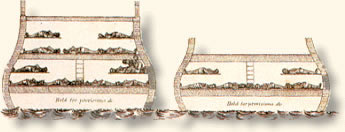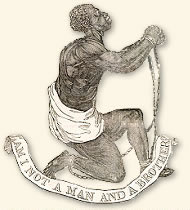
Aboard a Slave Ship, 1892
Walsh, Robert, Notices of Brazil in 1828 and 1829 (1831).
Interception at Sea
Conditions aboard the slave ships were wretched. Men, women and children crammed into every available space, denied adequate room, food or breathing space. The stench was appalling - the atmosphere inhumane to say the least. The Reverend Robert Walsh served aboard one of the ships assigned to intercept the slavers off the African coast. On the morning of May 22, 1829, a suspected slaver was sighted and the naval vessel gave chase. The next day, a favorable wind allowed the interceptor to gain on its quarry and approach close enough to fire two shots across her bow. The slaver heaved to and an armed party from the interceptor scrambled aboard her. We join Reverend Walsh's account as he boards the slave ship:
"The first object that struck us was an enormous gun, turning on a swivel, on deck - the constant appendage of a pirate; and the next were large kettles for cooking, on the bows - the usual apparatus of a slaver. Our boat was now hoisted out, and I went on board with the officers. When we mounted her decks we found her full of slaves. She was called the Feloz, commanded by Captain Jose' Barbosa, bound to Bahia. She was a very broad-decked ship, with a mainmast, schooner rigged, and behind her foremast was that large, formidable gun, which turned on a broad circle of iron, on deck, and which enabled her to act as a pirate if her slaving speculation failed. She had taken in, on the coast of Africa, 336 males and 226 females, making in all 562, and had been out seventeen days, during which she had thrown overboard 55. The slaves were all inclosed under grated hatchways between decks. The space was so low that they sat between each other's legs and [were] stowed so close together that there was no possibility of their lying down or at all changing their position by night or day. As they belonged to and were shipped on account of different individuals, they were all branded like sheep with the owner's marks of different forms. These were impressed under their breasts or on their arms, and, as the mate informed me with perfect indifference 'burnt with the red-hot iron.' Over the hatchway stood a ferocious-looking fellow with a scourge of many twisted thongs in his hand, who was the slave driver of the ship, and whenever he heard the slightest noise below, he shook it over them and seemed eager to exercise it. I was quite pleased to take this hateful badge out of his hand, and I have kept it ever since as a horrid memorial of reality, should I ever be disposed to forget the scene I witnessed.

Plan for "stowage" of a slaveship, 1790
As soon as the poor creatures saw us looking down at them, their dark and melancholy visages brightened up. They perceived some- thing of sympathy and kindness in our looks which they had not been accustomed to, and, feeling instinctively that we were friends, they immediately began to shout and clap their hands. One or two had picked up a few Portuguese words, and cried out, "Viva! Viva!" The women were particularly excited. They all held up their arms, and when we bent down and shook hands with them, they could not contain their delight; they endeavored to scramble up on their knees, stretching up to kiss our hands, and we understood that they knew we were come to liberate them. Some, however, hung down their heads in apparently hopeless dejection; some were greatly emaciated, and some, particularly children, seemed dying.
But the circumstance which struck us most forcibly was how it was possible for such a number of human beings to exist, packed up and wedged together as tight as they could cram, in low cells three feet high, the greater part of which, except that immediately under the grated hatchways, was shut out from light or air, and this when the thermometer, exposed to the open sky, was standing in the shade, on our deck, at 89'. The space between decks was divided into two compartments 3 feet 3 inches high; the size of one was 16 feet by 18 and of the other 40 by 21; into the first were crammed the women and girls, into the second the men and boys: 226 fellow creatures were thus thrust into one space 288 feet square and 336 into another space 800 feet square, giving to the whole an average Of 23 inches and to each of the women not more than 13 inches. We also found manacles and fetters of different kinds, but it appears that they had all been taken off before we boarded.
 |
| Cross section of the stowage of a slave ship, 1790
|
After enjoying for a short time the unusual luxury of air, some water was brought; it was then that the extent of their sufferings was exposed in a fearful manner. They all rushed like maniacs towards it. No entreaties or threats or blows could restrain them; they shrieked and struggled and fought with one another for a drop of this precious liquid, as if they grew rabid at the sight of it.
It was not surprising that they should have endured much sickness and loss of life in their short passage. They had sailed from the coast of Africa on the 7th of May and had been out but seventeen days, and they had thrown overboard no less than fifty-five, who had died of dysentery and other complaints in that space of time, though they had left the coast in good health. Indeed, many of the survivors were seen lying about the decks in the last stage of emaciation and in a state of filth and misery not to be looked at. Even-handed justice had visited the effects of this unholy traffic on the crew who were engaged in it. Eight or nine had died, and at that moment six were in hammocks on board, in different stages of fever. This mortality did not arise from want of medicine. There was a large stock ostentatiously displayed in the cabin, with a manuscript book containing directions as to the quantities; but the only medical man on board to prescribe it was a black, who was as ignorant as his patients.
 |
| Image from an abolitionist pamphlet, 1837
|
www.eyewitnesstohistory.com/slaveship.htm
